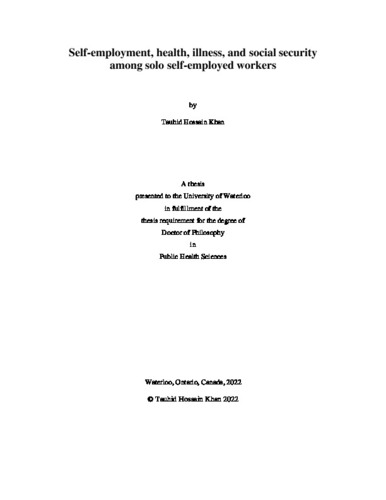| dc.description.abstract | Today’s labour market has changed over time, shifting from full-time, secured, and standard employment relationships to entrepreneurial and precarious working arrangements. Thus, self-employment (SE) has been growing rapidly in recent decades due to globalization, automation, dramatic technological advances, the information revolution, and the recent rise of the ‘gig economy’. More than 60% of workers worldwide are in non-standard employment relationships; hence their employment positions are precarious. This precarity profoundly impacts workers’ health and well-being, undermining the comprehensiveness of social security systems, employment standards, and occupational health and safety policies. The general goal of this research was to focus on the circumstances of solo self-employed (SE’d) workers, investigating how they navigate, experience, and manage their injuries/illness in the context of their work.
To explore this, this dissertation combines three findings’ manuscripts: (i) the first manuscript, based on a scoping review, critically reviewed the peer-reviewed literature focusing on advanced economies to understand how SE’d workers navigate, experience, or manage their injuries and illness when unable to work. The scoping review was a critical interpretive synthesis, following Dixon-Woods et al. (2006). (ii) The second manuscript considered how self-employed people access social support systems when they are not working due to injury and sickness in the two comparable countries of Canada and Australia. This comparative policy analysis adopted ‘interpretive policy analysis’ (Yanow, 2000), which involved analyzing public policies as a form of text or representation of social actions. (iii) Finally, the third manuscript examined how SE’d workers in Ontario, Canada were protected with available social security systems, following illness, injury, and income reduction or loss. Drawing on-depth interviews with 24 solo SE’d people; thematic analysis was conducted based on participant narratives.
Findings revealed that one of the challenges of providing support to SE’d people is derived from unclear definitions of who is SE’d. Thus, based on peer-reviewed literature, this dissertation demystified the conceptualization of SE and explored why people choose SE, including the push and pull factors. The comparative policy analysis revealed that support for SE’d workers following their injury or sickness was barely present in the relevant policies in Australia (NSW) and Canada (Ontario). In both cases, the SE’d workers tended to be homogenized in policy documents and literature as financially prosperous, younger, and highly educated. In this context, this study argues that a significant number of SE’d workers living in both jurisdictions need income support during their absence from work due to injury and sickness. This dissertation also explored the experiences of SE’d workers in Ontario in terms of social security systems that SE’d workers encountered when ill or injured. The study identified several constraints to social security access in this context: premium affordability, information/knowledge gap, lack of SE social support programs, the red tape of bureaucracy, confidence about savings, and lack of trust in the government-regulated system. | en |

